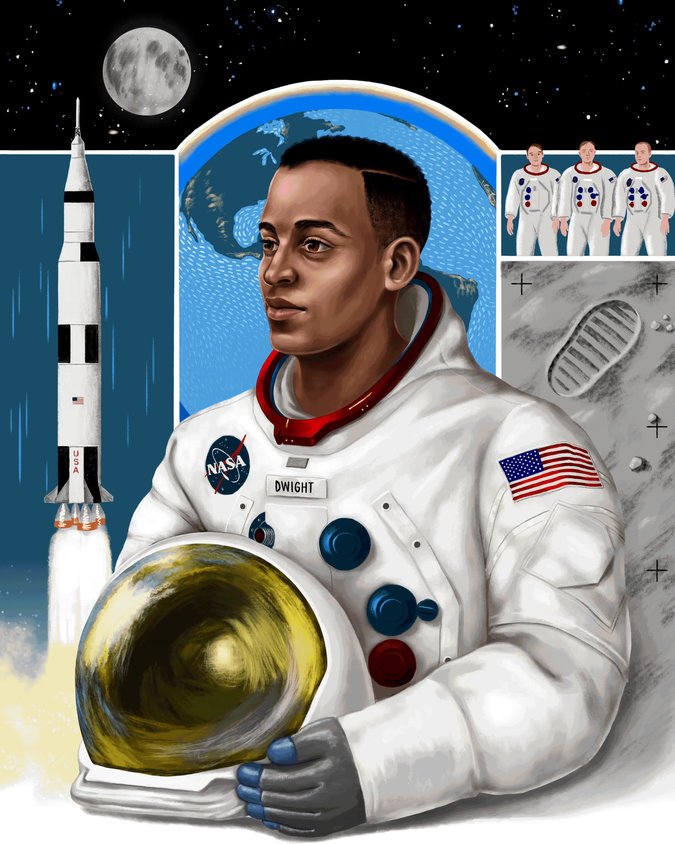Edward Dwight is a 90-year-old man, one of the first African American test pilots in the United States Air Force, he’s a sculptor and a published author. In many ways, he’s a man of many faces. But now he has another title, a title that he wanted over 60 years ago; astronaut.
High Flying
Dwight loved planes ever since he was a little boy. At the age of four, he would build little models of airplanes made out of orange crates in his backyard, and toss them into the air. He would watch in astonishment as they glided across the yard. He was born and raised in the racially segregated Kansas City, Kansas area in the 1930s. Dwight excelled at school, was gifted in mechanics, and was an avid reader. After completing high school, Dwight was unsure of what to do next. More than anything he wanted to be an Air Force pilot but at the current time, almost no black pilots were in the military. So he enrolled at the Kansas City Junior College and graduated with an Associate of Arts degree in engineering in 1953. By the time he graduated, some black pilots were enlisted in the Air Force, this gave Dwight enough to pursue his dream of flying and he enlisted into the military.
Dwight completed all of his training at Lackland Air Force Base in Texas, afterwards he was assigned to Williams Air Force Base, in Arizona. He took additional night classes studying Latian. Throughout 6 years Dwight earned the rank of captain in the Air Force and later participated in test piloting and aerospace research.
A Different Race In Space
*It was 1959, and at the time Massachusetts Senator John F. Kennedy was holding a meeting with some of the most influential civil rights leaders of the time; Dr. Martin Luther King, Whitney Young, Philip Randolph, and the Senator brothers; Bobby Kennedy. The men were discussing how to break down barriers of discrimination and racism in the United States. The story goes that Whitney Young of the National Urban League suggested putting a black astronaut into space. It seemed like a good path to pave in the long road of desegregating the country after all the Mercury 7 astronauts had just been announced and the United States was in a deadlock space race with the Soviet Union. NASA was receiving a tremendous amount of funding from Congress, some would say that NASA had a limitless budget. A black astronaut in space was green-lighted by John F. Kennedy in the summer of 1960 when his presidential campaign was ramping up.
*There is no official historical record of this meeting therefore making it questionable.*
A group of government employees went out searching for a black test pilot who would fit the requirements for spaceflight. After surveying and observing all of the top pilots in the military, they found one. Ed Dwight was offered the chance to become an astronaut, and he accepted. At first Dwight was overjoyed, he was going to be a part of history, and he was going to make a statement to a separated country that a different race could fly into the heavens. But Dwight never expected the media coverage and backlash he received. He was on the page of every newspaper, was interviewed several times a day, and made it onto magazine covers, his personal life was torn upside down by all of the death threats sent to his house.
Although Dwight had experience with flying he was thrown into a loop before he could begin normal astronaut training, Dwight would attend pre-astronaut flight training. These sessions were taught by Chuck Yeager, the first man to break the speed of sound. But Yeager was not a friend of Dwight, the famed pilot was disgusted by the idea of a black man in space. The day before Dwight arrived for training, Yeager told all of the pilots to not speak to Dwight. Over several months, Yeager repeatedly attempted to make sure Dwight would fail his training. He could come up with near-impossible tasks that only Dwight would have to complete, to his instructor's dismay he passed anything that Yeager would throw at him. Everyone else was trying to get Dwight to fail as well, politicians and military officers attempted to remove him from the training.
But there was one man who supported Dwight, President Kennedy made sure that the efforts to remove the first black astronaut were in vain. No one would dare question the president's decision. It seemed like Dwight would be selected for NASA after all.
Grounded
When Kennedy was assassinated in November 1963, the dream of the black astronaut in space seemed to die with him. Dwight lost his support, protection, and dream, it was clear that the new president Lyndon B. Johnson wanted nothing to do with him. Without support from the White House Dwight became discouraged, the angry politicians would kick him out to the curb any day now and his family was receiving so much threatening mail. So Dwight quit, resigned from the Air Force, and decided to pursue sculpting. He made his own Art Studio called Ed Dwight Studios, where he displays many of his fine art pieces. Dwight has created 129 memorial sculptures and over 18,000 gallery pieces. Even though he couldn’t go to space Dwight was happy to fulfill his career in sculpting.
A Second Chance
Dwight fulfilled his dream to go to space on May 19, 2024. He was 90 when the privately owned Blue Origin Aerospace company selected him for a suborbital spaceflight. When the rocket launched, he was reportedly laughing the whole time, "Fantastic! A life-changing experience. Everyone needs to do this!" he remarked. "I didn't know I needed this in my life, but now I need it in my life." The whole flight lasted about 10 minutes.
But this may not be the end of spaceflight for Dwight however, "I want to go into orbit. I want to go around the Earth and see the whole Earth. That's what I want to do now." he said in an interview the next day.
Well what can I say? After all, he reached space.
Acknowledgements
I have loved writing for the PFMS times, but now I must say goodbye in my final article. I would like to thank my editors Mr. Cimino and Mr. Harper for fixing my many grammatical errors, I would like to thank my father Mr. Cunningham for publishing my articles, I would like to thank my friends and family for encouraging me to write what I love, and I would like to thank NASA and all of the other space programs that have given me something to write about.
It's been an honor
-Kale Cunningham :)
Sources: NPR, USA Today, CBS

